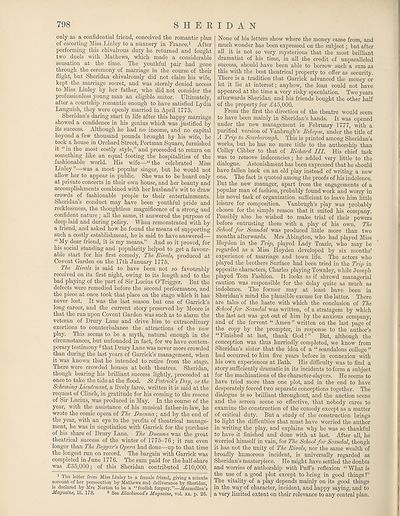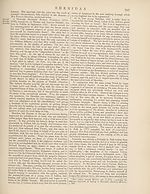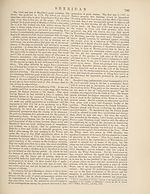Encyclopaedia Britannica > Volume 21, ROT-Siam
(808) Page 798
Download files
Complete book:
Individual page:
Thumbnail gallery: Grid view | List view

798
SHERIDAN
only as a confidential friend, conceived the romantic plan
of escorting Miss Linley to a nunnery in France.1 After
performing this chivalrous duty he returned and fought
two duels with Mathews, which made a considerable
sensation at the time. The youthful pair had gone
through the ceremony of marriage in the course of their
flight, but Sheridan chivalrously did not claim his wife,
kept the marriage secret, and was sternly denied access
to Miss Linley by her father, who did not consider the
professionless young man an eligible suitor. Ultimately,
after a courtship romantic enough to have satisfied Lydia
Languish, they were openly married in April 1773.
Sheridan’s daring start in life after this happy marriage
showed a confidence in his genius which was justified by
its success. Although he had no income, and no capital
beyond a few thousand pounds brought by his wife, he
took a house in Orchard Street, Portman Square, furnished
it “in the most costly style,” and proceeded to return on
something like an equal footing the hosjfitalities of the
fashionable world. His wife—“ the celebrated Miss
Linley”—was a most popular singer, but he would not
allow her to appear in public. She was to be heard only
at private concerts in their own house, and her beauty and
accomplishments combined with her husband’s wit to draw
crowds of fashionable people to their entertainments.
Sheridan’s conduct may have been youthful pride and
recklessness, the thoughtless magnificence of a strong and
confident nature; all the same, it answered the purpose of
deep-laid and daring policy. When remonstrated with by
a friend, and asked how he found the means of supporting
such a costly establishment, he is said to have answered—
“My dear friend, it is my means.” And so it proved, for
his social standing and popularity helped to get a favour¬
able start for his first comedy, The Rivals, produced at
Covent Garden on the 17th January 1775.
The Rivals is said to have been not so favourably
received on its first night, owing to its length and to the
bad playing of the part of Sir Lucius O’Trigger. But the
defects were remedied before the second performance, and
the piece at once took that place on the stage which it has
never lost. It was the last season but one of Garrick’s
long career, and the current story preserved by Moore is
that the run upon Covent Garden was such as to alarm the
veteran of Drury Lane and drive him to extraordinary
exertions to counterbalance the attractions of the new
play. This seems to be a myth, natural enough in the
circumstances, but unfounded in fact, for we have contem¬
porary testimony 2 that Drury Lane was never more crowded
than during the last years of Garrick’s management, when
it was known that he intended to retire from the stage.
There were crowded houses at both theatres. Sheridan,
though bearing his brilliant success lightly, proceeded at
once to take the tide at the flood. St Patrick's Day, or the
Scheming Lieutenant, a lively farce, written it is said at the
request of Clinch, in gratitude for his coming to the rescue
of Sir Lucius, was produced in May. In the course of the
year, with the assistance of his musical father-in-law, he
wrote the comic opera of The Duenna; and by the end of
the year, with an eye to the profits of theatrical manage¬
ment, he was in negotiation with Garrick for the purchase
of his share of Drury Lane. The Duenna was the great
theatrical success of the winter of 1775—76; it ran even
longer than The Beggar’s Opera had done—up to that time
the longest run on record. The bargain with Garrick was
completed in June 1776. The sum paid for the half-share
was £35,000; of this Sheridan contributed £10,000.
1 The letter from Miss Linley to a female friend, giving a minute
account of her persecution by Mathews and deliverance by Sheridan,
is declared by Mrs Norton to be a “ foolish forgery. "—A/acww'ZWs
Magazine, iii. 178. 2 See Blackwood's Magazine, vol. xx. p. 26.
None of his letters show where the money came from, and
much wonder has been expressed on the subject; but after
all it is not so very mysterious that the most brilliant
dramatist of his time, in all the credit of unparalleled
success, should have been able to borrow such a sum as
this with the best theatrical property to offer as security.
There is a tradition that Garrick advanced the money or
let it lie at interest; anyhow, the loan could not have
appeared at the time a very risky speculation. Two years
afterwards Sheridan and his friends bought the other half
of the property for £45,000.
From the first the direction of the theatre would seem
to have been mainly in Sheridan’s hands. It was opened
under the new management in February 1777, with a
purified version of Vanbrugh’s Relapse, under the title of
A Trip to Scarborough. This is printed among Sheridan’s
works, but he has no more title to the authorship than
Colley Cibber to that of Richard III. His chief task
was to remove indecencies; he added very little to the
dialogue. Astonishment has been expressed that he should
have fallen back on an old play instead of writing a new
one. The fact is quoted among the proofs of his indolence.
But the new manager, apart from the engagements of a
popular man of fashion, probably found work and worry in
Lis novel task of organization sufficient to leave him little
leisure for composition. Vanbrugh’s play was probably
chosen for the simple reason that it suited his company.
Possibly also he wished to make trial of their powers
before entrusting them with a play of his own. The
School for Scandal was produced little more than two
months afterwards. Mrs Abington, who had played Miss
Hoyden in the Trip, played Lady Teazle, who may be
regarded as a Miss Hoyden developed by six months’
experience of marriage and town life. The actors who
played the brothers Surface had been tried in the Trip in
opposite characters, Charles playing Townley, while Joseph
played Tom Fashion. It looks as if shrewd managerial
caution was responsible for the delay quite as much as
indolence. The former may at least have been in
Sheridan’s mind the plausible excuse for the latter. There
are tales of the haste with which the conclusion of The
School for Scandal was written, of a stratagem by which
the last act was got out of him by the anxious company,
and of the fervent “ Amen ” written on the last page of
the copy by the prompter, in response to the author’s
“Finished at last, thank God!” But, although the
conception was thus hurriedly completed, we know from
Sheridan’s sister that the idea of a “ scandalous college ”
had occurred to him five years before in connexion with
his own experiences at Bath. His difficulty was to find a
story sufficiently dramatic in its incidents to form a subject
for the machinations of the character-slayers. He seems to
have tried more than one plot, and in the end to have
desperately forced two separate conceptions together. The
dialogue is so brilliant throughout, and the auction scene
and the screen scene so effective, that nobody cares to
examine the construction of the comedy except as a matter
of critical duty. But a study of the construction brings
to light the difficulties that must have worried the author
in writing the play, and explains why he was so thankful
to have it finished and done with at last. After all, he
worried himself in vain, for The School for Scandal, though
it has not the unity of The Rivals, nor the same wealth of
broadly humorous incident, is universally regarded as
Sheridan’s masterpiece. He might have settled the doubts
and worries of authorship with Puff’s reflexion “ What is
the use of a good plot except to bring in good things ?”
The vitality of a play depends mainly on its good things
in the way of character, incident, and happy saying, and to
a very limited extent on their relevance to any central plan.
SHERIDAN
only as a confidential friend, conceived the romantic plan
of escorting Miss Linley to a nunnery in France.1 After
performing this chivalrous duty he returned and fought
two duels with Mathews, which made a considerable
sensation at the time. The youthful pair had gone
through the ceremony of marriage in the course of their
flight, but Sheridan chivalrously did not claim his wife,
kept the marriage secret, and was sternly denied access
to Miss Linley by her father, who did not consider the
professionless young man an eligible suitor. Ultimately,
after a courtship romantic enough to have satisfied Lydia
Languish, they were openly married in April 1773.
Sheridan’s daring start in life after this happy marriage
showed a confidence in his genius which was justified by
its success. Although he had no income, and no capital
beyond a few thousand pounds brought by his wife, he
took a house in Orchard Street, Portman Square, furnished
it “in the most costly style,” and proceeded to return on
something like an equal footing the hosjfitalities of the
fashionable world. His wife—“ the celebrated Miss
Linley”—was a most popular singer, but he would not
allow her to appear in public. She was to be heard only
at private concerts in their own house, and her beauty and
accomplishments combined with her husband’s wit to draw
crowds of fashionable people to their entertainments.
Sheridan’s conduct may have been youthful pride and
recklessness, the thoughtless magnificence of a strong and
confident nature; all the same, it answered the purpose of
deep-laid and daring policy. When remonstrated with by
a friend, and asked how he found the means of supporting
such a costly establishment, he is said to have answered—
“My dear friend, it is my means.” And so it proved, for
his social standing and popularity helped to get a favour¬
able start for his first comedy, The Rivals, produced at
Covent Garden on the 17th January 1775.
The Rivals is said to have been not so favourably
received on its first night, owing to its length and to the
bad playing of the part of Sir Lucius O’Trigger. But the
defects were remedied before the second performance, and
the piece at once took that place on the stage which it has
never lost. It was the last season but one of Garrick’s
long career, and the current story preserved by Moore is
that the run upon Covent Garden was such as to alarm the
veteran of Drury Lane and drive him to extraordinary
exertions to counterbalance the attractions of the new
play. This seems to be a myth, natural enough in the
circumstances, but unfounded in fact, for we have contem¬
porary testimony 2 that Drury Lane was never more crowded
than during the last years of Garrick’s management, when
it was known that he intended to retire from the stage.
There were crowded houses at both theatres. Sheridan,
though bearing his brilliant success lightly, proceeded at
once to take the tide at the flood. St Patrick's Day, or the
Scheming Lieutenant, a lively farce, written it is said at the
request of Clinch, in gratitude for his coming to the rescue
of Sir Lucius, was produced in May. In the course of the
year, with the assistance of his musical father-in-law, he
wrote the comic opera of The Duenna; and by the end of
the year, with an eye to the profits of theatrical manage¬
ment, he was in negotiation with Garrick for the purchase
of his share of Drury Lane. The Duenna was the great
theatrical success of the winter of 1775—76; it ran even
longer than The Beggar’s Opera had done—up to that time
the longest run on record. The bargain with Garrick was
completed in June 1776. The sum paid for the half-share
was £35,000; of this Sheridan contributed £10,000.
1 The letter from Miss Linley to a female friend, giving a minute
account of her persecution by Mathews and deliverance by Sheridan,
is declared by Mrs Norton to be a “ foolish forgery. "—A/acww'ZWs
Magazine, iii. 178. 2 See Blackwood's Magazine, vol. xx. p. 26.
None of his letters show where the money came from, and
much wonder has been expressed on the subject; but after
all it is not so very mysterious that the most brilliant
dramatist of his time, in all the credit of unparalleled
success, should have been able to borrow such a sum as
this with the best theatrical property to offer as security.
There is a tradition that Garrick advanced the money or
let it lie at interest; anyhow, the loan could not have
appeared at the time a very risky speculation. Two years
afterwards Sheridan and his friends bought the other half
of the property for £45,000.
From the first the direction of the theatre would seem
to have been mainly in Sheridan’s hands. It was opened
under the new management in February 1777, with a
purified version of Vanbrugh’s Relapse, under the title of
A Trip to Scarborough. This is printed among Sheridan’s
works, but he has no more title to the authorship than
Colley Cibber to that of Richard III. His chief task
was to remove indecencies; he added very little to the
dialogue. Astonishment has been expressed that he should
have fallen back on an old play instead of writing a new
one. The fact is quoted among the proofs of his indolence.
But the new manager, apart from the engagements of a
popular man of fashion, probably found work and worry in
Lis novel task of organization sufficient to leave him little
leisure for composition. Vanbrugh’s play was probably
chosen for the simple reason that it suited his company.
Possibly also he wished to make trial of their powers
before entrusting them with a play of his own. The
School for Scandal was produced little more than two
months afterwards. Mrs Abington, who had played Miss
Hoyden in the Trip, played Lady Teazle, who may be
regarded as a Miss Hoyden developed by six months’
experience of marriage and town life. The actors who
played the brothers Surface had been tried in the Trip in
opposite characters, Charles playing Townley, while Joseph
played Tom Fashion. It looks as if shrewd managerial
caution was responsible for the delay quite as much as
indolence. The former may at least have been in
Sheridan’s mind the plausible excuse for the latter. There
are tales of the haste with which the conclusion of The
School for Scandal was written, of a stratagem by which
the last act was got out of him by the anxious company,
and of the fervent “ Amen ” written on the last page of
the copy by the prompter, in response to the author’s
“Finished at last, thank God!” But, although the
conception was thus hurriedly completed, we know from
Sheridan’s sister that the idea of a “ scandalous college ”
had occurred to him five years before in connexion with
his own experiences at Bath. His difficulty was to find a
story sufficiently dramatic in its incidents to form a subject
for the machinations of the character-slayers. He seems to
have tried more than one plot, and in the end to have
desperately forced two separate conceptions together. The
dialogue is so brilliant throughout, and the auction scene
and the screen scene so effective, that nobody cares to
examine the construction of the comedy except as a matter
of critical duty. But a study of the construction brings
to light the difficulties that must have worried the author
in writing the play, and explains why he was so thankful
to have it finished and done with at last. After all, he
worried himself in vain, for The School for Scandal, though
it has not the unity of The Rivals, nor the same wealth of
broadly humorous incident, is universally regarded as
Sheridan’s masterpiece. He might have settled the doubts
and worries of authorship with Puff’s reflexion “ What is
the use of a good plot except to bring in good things ?”
The vitality of a play depends mainly on its good things
in the way of character, incident, and happy saying, and to
a very limited extent on their relevance to any central plan.
Set display mode to:
![]() Universal Viewer |
Universal Viewer | ![]() Mirador |
Large image | Transcription
Mirador |
Large image | Transcription
Images and transcriptions on this page, including medium image downloads, may be used under the Creative Commons Attribution 4.0 International Licence unless otherwise stated. ![]()
| Encyclopaedia Britannica > Encyclopaedia Britannica > Volume 21, ROT-Siam > (808) Page 798 |
|---|
| Permanent URL | https://digital.nls.uk/193637783 |
|---|
| Attribution and copyright: |
|
|---|---|
| Shelfmark | EB.17 |
|---|---|
| Description | Ten editions of 'Encyclopaedia Britannica', issued from 1768-1903, in 231 volumes. Originally issued in 100 weekly parts (3 volumes) between 1768 and 1771 by publishers: Colin Macfarquhar and Andrew Bell (Edinburgh); editor: William Smellie: engraver: Andrew Bell. Expanded editions in the 19th century featured more volumes and contributions from leading experts in their fields. Managed and published in Edinburgh up to the 9th edition (25 volumes, from 1875-1889); the 10th edition (1902-1903) re-issued the 9th edition, with 11 supplementary volumes. |
|---|---|
| Additional NLS resources: |
|

